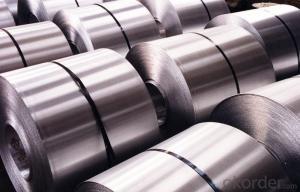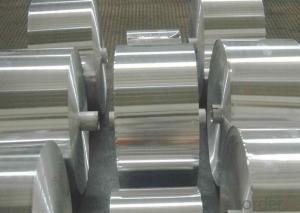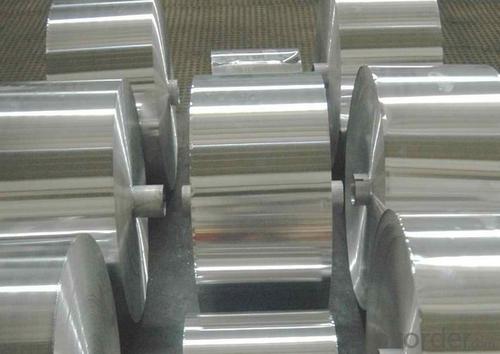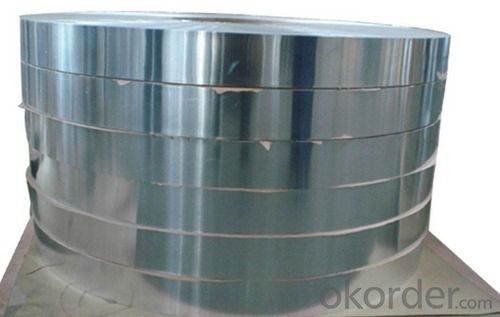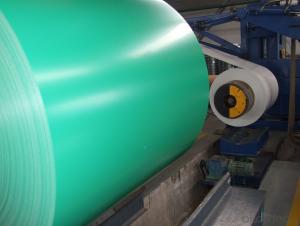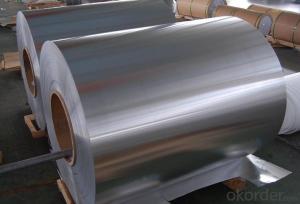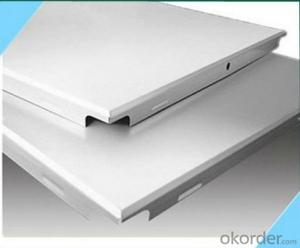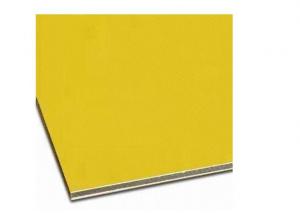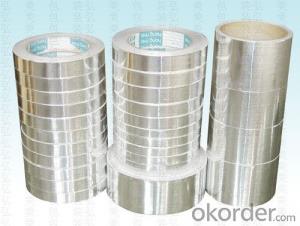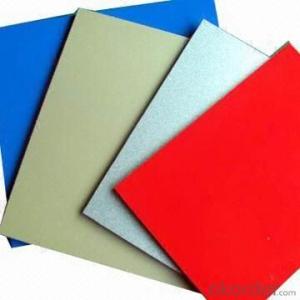Anodized Aluminum Coil for ACP (Aluminum Composite Panel)
- Loading Port:
- Shanghai
- Payment Terms:
- TT OR LC
- Min Order Qty:
- 1 m.t.
- Supply Capability:
- 2000 m.t./month
OKorder Service Pledge
OKorder Financial Service
You Might Also Like
Specification
Product Description:
The heat treatable alloys of 2000, 6000 and 7000 are such that when subjected to thermal temperatures, they again pronounced strengthening. Hence, tempers are indicated by "T". These alloys are also inventoried in clad form to increase corrosion resistance. All of the aluminum alloys are available in the annealed condition or commonly referred to as "O".
Aerospace - 2024, 6013, 6061, 7075
Construction - 3003, 5052, 6061
Electrical and Chemical Applications - 1100
General Machining Applications - 3003, 5052
Thickness from 0.18mm to more than 200mm are available for your needs. Aluminum can process to your special requirements and support traceability with complete Mill Test Certificate(MTC) and the essential industry specifications. More details about Aluminum sheet coil for Beverage Cans, Food Cans & Closures as following
Aluminum coil for aluminum composite panel
Always present in the development of aluminum coil for the Beverage Cans Making Industry, LingFeng offers Aluminum Coils for Beverage Can Body Stock, Coated End Stock and Bare or Coated Tab Stock. Lingfeng rolling facilities include: Modern equipment that guarantees high efficiency in the can makers lines and possible light-weight. A state-of-the-art lacquering line suitable for the coating of easy open end and tabe. PVC-free, BADGE-free and Solvent-free (free-based) lacquering systems are applied.
Being able to produce according to detailed customer requirements, Lingfeng can provide tailor-made solutions.
Aluminum sheet coil for Food Cans
New lacquerng line is suitable for the coating of bodies, lids and tabs of rectangular or round Food Cans for aggressive food or fruit-juice products. BADGE-free and Solvent-free (water-based) lacquering systems are applied. The material can also be supplied degreased, chromium phosphated and DOS treated.
Aluminum sheet coil for Closures
Committed to continuous development and full customer satisfaction, Lingfeng offers Pre-treated and Pre-coated Coils or Straight-cut Sheets for the production of Pilfer-proof Caps. Lingfeng provides high quality non-earing material, suitable for both one and two step Drawn Caps. Rolling experience and new lacquering facilities ensure excellent service in terms of products range and J. I. T deliveries providing Closures in three different aluminum alloys and two alternative finishes, bare or coated. Lingfeng material is used for the production of Pilfer Caps for carbonated and non-carbonated beverages, alcoholic or non-alcoholic drinks and as closures for pharmaceutical products.
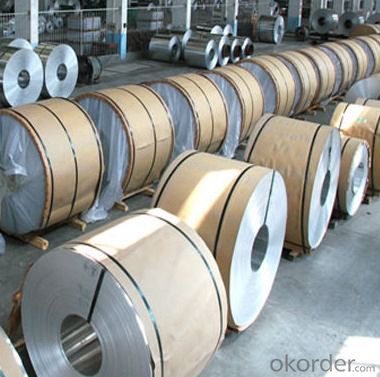
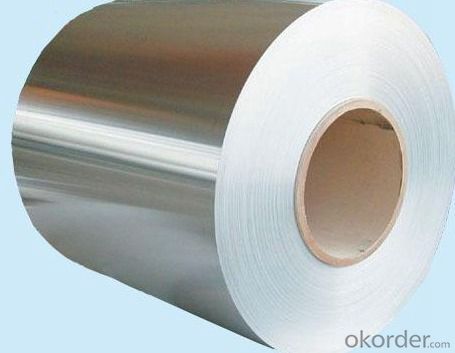
Aluminium Coil PPGL Specification:
Quality Certification
According to EN and GB/T standards or as per agreed customer specifications.
Aluminum Coil for Beverage Cans, Food Cans and Closures Specifications
| Production Range (mm) | |||||
| Aluminum Sheets/Coils for Food Cans | Aluminum Sheets/Coils for Food Cans | ||||
| Thickness | Width | Thickness | Width | Length | |
| Body | 0.250 min. | 2300 max. | 0.18-0.25 | 500-1020 | 1045 max. |
| End | 0.222 min. | 2300 max. | 0.20-0.30 | 100-1020 | 1045 max. |
| Tab | 0.235 min. | 45 min. | 45 min | 29 min. | Coils only |
| Production Range (mm) | ||||
| Beverage Cans- Dimension | Food Cans-Coil Dimensions | |||
| Inside Diameter | Outside Diameter | Inside Diameter | Outside Diameter | |
| Body | 400 or 500 | 1850 max. | 400 or 500 | 1800 max. |
| End | 400 or 500 | 1850 max. | 300 or 400 or 500 | 1800 max. |
| Tab | 400 | 1850 max. | 300 or 500 | 1800 max. |
| Closures-Dimension Range | |
| Thickness | 0.20-0.3 |
| Width | 500-1020 |
| Length(Sheet) | 1045 max. |
| Inside Diameter | 300 or 400 or 500 on carton core |
| Outside Diameter | 1800 max |
| Finishes-Treatment | |||
| Beverage | Food | Closures | |
| Body: | Pre-lubricated: According to customer requirement. | Degreased, Chromium phosphate converted and DOS treated. | Pre-treated: Degreased, Chromium phosphate converted and if requested DOS treated. |
| End: | Pre-coated & Pre-maxed: According to customer requirements. | Pre-treated: Degreased, Chromium phosphate converted and DOS treated. Coated: Pre-waxed and lacquered on public or product side of the can, or both. | Coated: Lacquered on either or both sides. |
| Tab: | Coated: Clear or coloured expoxy, or bare: degreased and DOS re-oiled | Coated: Clear or coloured coated or bare: degreased and DOS re-oiled | |
FAQ of Aluminium Coil for ACP (Aluminum Composite Panel):
1.Superior quality of raw material.
2.Reasonable and stable chemical composition.
3.Accurate tolerance.
4.Goode mechanical property.
5.We have the certificate of ISO9001.
- Q: Can aluminum coils be used for signage and display applications?
- Yes, aluminum coils can be used for signage and display applications. Aluminum is a versatile and lightweight material that is widely used in the signage industry. Aluminum coils can be easily formed into various shapes and sizes, making them suitable for a variety of signage and display applications. Aluminum coils are commonly used for outdoor signs, such as billboards, building signs, and traffic signs, due to their excellent weather resistance and durability. They can withstand harsh weather conditions, including rain, snow, and UV exposure, without rusting or fading. This makes them a reliable choice for long-lasting signage. Additionally, aluminum coils can be coated with a variety of finishes, such as paint or powder coating, to enhance their appearance and provide additional protection against corrosion. This allows for customization and branding options, making aluminum coils suitable for both functional and decorative signage. In terms of display applications, aluminum coils can be used to create exhibition stands, trade show displays, retail displays, and various other promotional materials. Their lightweight nature makes them easy to transport, assemble, and disassemble, which is beneficial for portable displays. Furthermore, aluminum coils can be easily printed on or laminated, allowing for the incorporation of graphics and visuals to attract attention and convey messages effectively. Overall, aluminum coils are a versatile and durable material that can be used for a wide range of signage and display applications. Their weather resistance, customizable finishes, and lightweight properties make them a popular choice in the industry.
- Q: What are the disadvantages of using aluminum coils?
- One of the disadvantages of using aluminum coils is their susceptibility to corrosion. Aluminum is a reactive metal and can easily oxidize when exposed to moisture and certain chemicals, leading to corrosion and degradation of the coils over time. Additionally, aluminum coils may be more expensive compared to other coil materials such as copper, which can impact the overall cost of HVAC systems or other applications that utilize coils.
- Q: Can aluminum coils be used in the production of sporting goods?
- Yes, aluminum coils can be used in the production of sporting goods. Aluminum is a lightweight and durable material that is commonly used in the manufacturing of various sporting goods such as baseball bats, tennis rackets, golf clubs, and bicycles. Aluminum coils are often used as a raw material in the production process to create the desired shape and structure of these sporting goods. The use of aluminum in sporting goods offers numerous advantages, including improved performance, increased durability, and enhanced weight distribution. Additionally, aluminum is resistant to corrosion, which makes it ideal for outdoor sporting activities. Overall, aluminum coils are widely utilized in the production of sporting goods due to their versatility, strength, and ability to enhance the overall performance of these products.
- Q: Is it possible to use an aluminum coil for cooking rice?
- <p>While it is technically possible to use an aluminum coil to cook rice, it is not recommended due to potential health risks. Aluminum can leach into food, especially when heated, and long-term exposure to aluminum may have adverse effects on health. Instead, use materials like stainless steel, cast iron, or non-stick cookware specifically designed for cooking rice to ensure safety and better results.</p>
- Q: Is it possible to utilize aluminum coils in the construction of solar panels or wind turbines?
- <p>Aluminum coils can be used in the construction of both solar panels and wind turbines, but not as the primary material for energy conversion. In solar panels, aluminum is often used for framing and mounting structures due to its lightweight and corrosion-resistant properties. For wind turbines, aluminum is utilized in the manufacturing of certain components such as nacelle shells and towers, but the main rotor blades are typically made from composite materials for their strength and aerodynamic properties. Thus, while aluminum plays a supportive role in these renewable energy technologies, it is not the core material for capturing solar or wind energy.</p>
- Q: How are aluminum coils tested for surface adhesion?
- Aluminum coils are tested for surface adhesion through various methods to ensure the quality and performance of the material. One common method is the tape test, where a piece of adhesive tape is applied firmly to the surface of the coil and then quickly removed. The adhesion is evaluated by assessing the amount of coating or paint that comes off with the tape. If excessive coating is removed, it indicates poor surface adhesion. Another method involves using a cross-cut or knife test, where a grid pattern is cut into the surface of the coil using a sharp blade. The grid is then covered with an adhesive tape and quickly removed. The adhesion is evaluated by examining the amount of coating or paint that is removed from the cut lines. If there is minimal or no coating removal, it indicates good surface adhesion. In addition, the pull-off adhesion test is often conducted using specialized equipment. This test involves attaching a device to the surface of the coil and applying a gradually increasing force until the coating or paint starts to detach. The force required to cause the detachment is measured, and it provides a quantitative measure of the surface adhesion strength. Overall, these testing methods help manufacturers assess the surface adhesion of aluminum coils and ensure that they meet the required standards for various applications, such as in the automotive, aerospace, or construction industries.
- Q: Can aluminum coils be used for automotive heat shields?
- Yes, aluminum coils can be used for automotive heat shields. Aluminum is a lightweight and durable material that has excellent heat resistance properties, making it suitable for use in automotive heat shields. Its ability to dissipate heat efficiently helps protect sensitive components from excessive heat, ensuring optimal performance and durability in vehicles.
- Q: This question asks for methods to prevent rusting on aluminum coils during storage and transportation.
- <p>To prevent rusting on aluminum coils during storage and transportation, ensure that the coils are clean and dry before storage. Use a protective coating or wrapping to shield them from moisture and contaminants. Store the coils in a cool, dry place away from direct sunlight and corrosive substances. Avoid stacking them where they may come into contact with acidic materials. During transportation, secure the coils properly to prevent movement that could lead to scratches or damage. Use moisture-resistant covers to protect them from the elements. Regularly inspect the coils for signs of corrosion and address any issues promptly.</p>
- Q: Does anyone know if aluminum skateboards are good?
- I haven't seen one since the old QuickSilver-Silver Surfer(circa 1979). They look great, but they become useless when scratched. Which means....you can't really use them for anything. They're not as flexible as wood....and.......Wait until you get hit in the shin with an aluminum skateboard. Aircraft metal my(explicative deleted). My guess is they're inexpensive because they're trying to get the word out. The company owners probably no very little about skateboarding.
- Q: I need to make aluminum powder that is fine! I don't have a mill to use or something like that. If I fill literally the whole coffee blender, will that get it fine? I want to make an ok amount of it. I tried to use sand paper which makes it as fine as I want it but takes a while of sanding.
- How to make fine aluminum powder?
Send your message to us
Anodized Aluminum Coil for ACP (Aluminum Composite Panel)
- Loading Port:
- Shanghai
- Payment Terms:
- TT OR LC
- Min Order Qty:
- 1 m.t.
- Supply Capability:
- 2000 m.t./month
OKorder Service Pledge
OKorder Financial Service
Similar products
Hot products
Hot Searches
Related keywords
